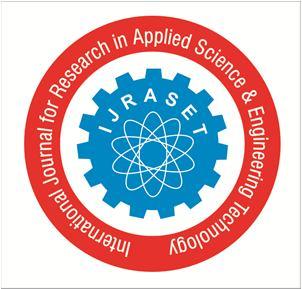
1 minute read
International Journal for Research in Applied Science & Engineering Technology (IJRASET)
from Mathematical Analysis of Car & Bridge Interaction Using Law of Physics for Vibration Formulation
by IJRASET

ISSN: 2321-9653; IC Value: 45.98; SJ Impact Factor: 7.538
Advertisement
Volume 11 Issue II Feb 2023- Available at www.ijraset.com
Left hand side of equation (4.7) will give
( 4 4) Y(x) = 0 (where d/c2 = 4 is a constant)
( 2 2) T (t) = 0
The above equations will lead toa C.F. (Complimentaryfunction) of the form:-
Y(x) = c1 + c2 + c3 + c4 … (4.8)
Using the identities = + and = ℎ + ℎ in the equation (4.8) wecan write the parameters of the trial solution as:-
Therefore equation (4.8) can be rewritten as
Y(x) = A₁ sin x +A₂ cosh x +A3 sinℎ x +A4 cos X … (4.9)
Differentiating two times equation (4.9) will give bending equation
Y’’(x) = 2 (-A₁ Sin x+A₂ Cosℎ x+A3 Sinℎ x-A4Cos x )
ACos t + BSin t
Value of = (1,2,3 ∞) ×
In summery;
Sin = 0 is frequency equationand
Yn = Cn Sin is mode shape function
On solvingthefourth order Euler – Bernoulli beam equation in theterm ofYn(x)of equation (4.9)and (4.10) four boundary conditions arerequired in case of simply supported beams:-
1) At the initial position of simply supported bridge (at x = 0), cos0 = cosh0 = 1 and sin0 = sinh0 = 0 putting the valuesA2 + A4 = nil
A2- A4 = nil
It is onlypossible in case of each one is individually zero. i.e. A1 = A3 = 0
2) Deflection and bending moment at end support (x=l) is zero i.e.:-A1Sinh l + A3Sin l = 0 & A1 2Sinh l - A3 2Sin l = 0
Squ Part-I Equation will give:- Part-II
A1A3Sinh Sin l= 0 ;
For non – zero values oneterm should have a length;So
aringpart-I
Sin 1 = SiniЛ = I Л øi = AiSin nππx/l (4.13)






